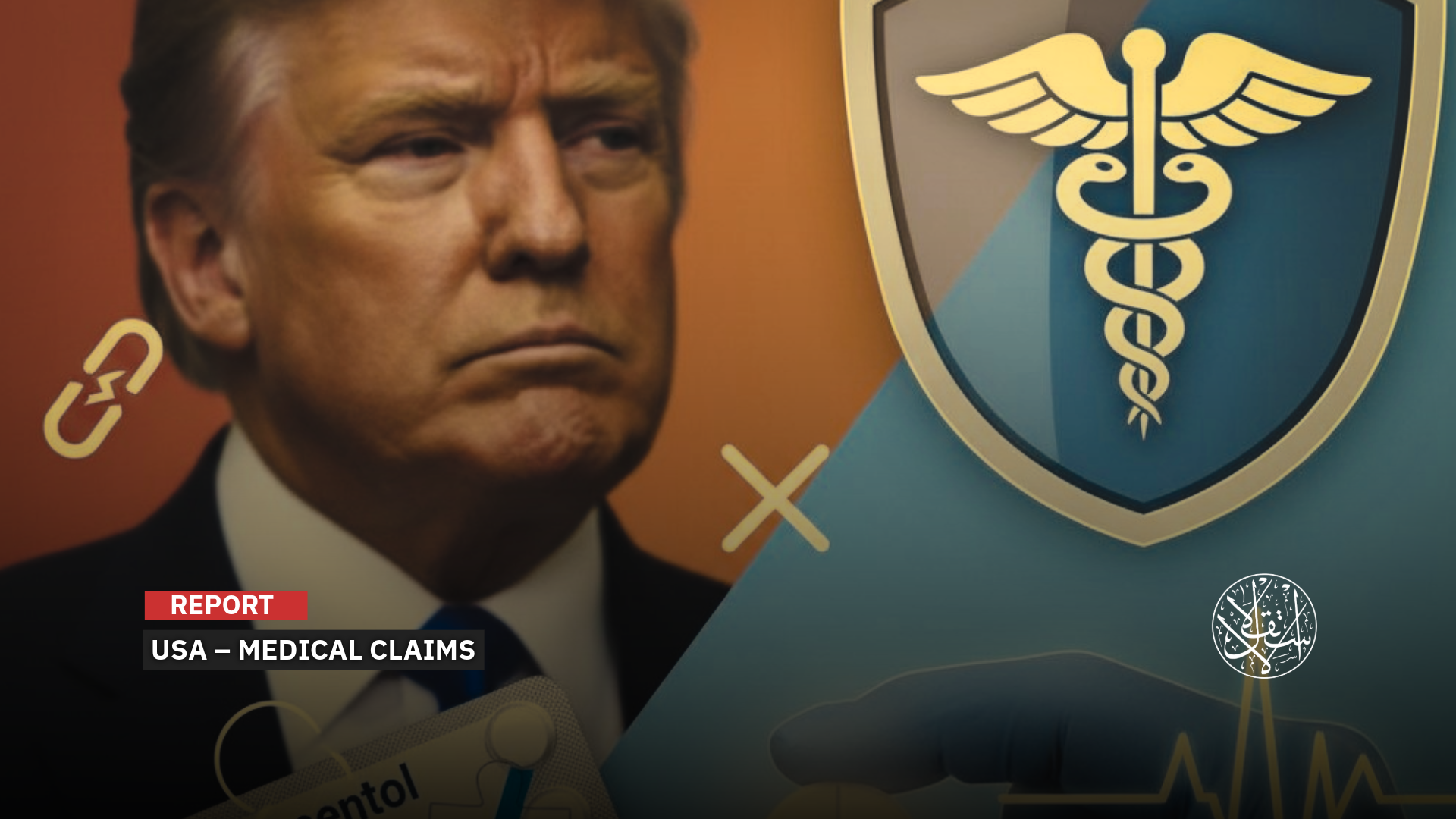Acetaminophen and Autism: Did Trump Reveal What Medical Institutions Have Been Hiding?

“More than 60% of women use Acetaminophen during pregnancy for fever or headaches.”
In the ongoing debate about public health issues, statements by US President Donald Trump regarding a possible link between acetaminophen use (known as Tylenol in the US) during pregnancy and autism have sparked widespread controversy.
He also promoted long-debunked claims that vaccines can cause autism, calling for changes to the childhood immunization schedule.
In contrast, global health authorities have emphasized the importance of adhering to reliable medical recommendations and not succumbing to unsubstantiated claims that could undermine public trust in medications and vaccines.
Acetaminophen, or paracetamol, is currently considered the only pain and fever reducer indicated for use during pregnancy.
It is estimated that more than 60% of women use Acetaminophen during pregnancy for fever, headaches, and other pain.
Without Acetaminophen, pregnant women face a stark choice between enduring untreated pain or fever or resorting to riskier alternatives such as Ibuprofen or Aspirin.
Safe Option
In an unprecedented White House press conference on September 22, US President Donald Trump offered unsolicited medical advice to pregnant women, reiterating his call for them not to take Acetaminophen.
Trump's bold statement sparked considerable debate within the medical and scientific communities, who considered it unsupported by conclusive evidence, amid concerns about its impact on the health of mothers and their children.
It comes at a time when the U.S. is witnessing a significant increase in the rate of autism, rising from one in 150 children in 2000 to approximately one in 30 today.
This coincidence has led some to question whether there is a link between the widely used Acetaminophen—of which Americans alone consume more than 40% of the world's annual acetaminophen production, valued at over $4 billion—and neurodevelopmental disorders.
The Food and Drug Administration (FDA) recently announced it would issue a letter to clinicians urging them to exercise caution regarding the use of Acetaminophen during pregnancy.
However, it emphasized that Acetaminophen remains a relatively safe option when used according to medical recommendations.
Trump's statements did not come out of nowhere, as the medical community had been discussing the issue since the early 2000s.
At that time, calls for caution garnered significant media attention, particularly following an article signed by nearly 100 researchers and physicians and published in Nature Reviews Endocrinology.
They based their concerns on experimental and epidemiological data suggesting that exposure to Acetaminophen during pregnancy may affect fetal development.
These statements stemmed from several studies that explored the potential link between Acetaminophen use and certain diseases, particularly autism.
One such study, published in 2015 in Autism Research and based on Danish health data, sparked considerable controversy.
The study followed children until age 12 and concluded that the risk of autism increased by 50% when the mother took medications containing Acetaminophen during pregnancy.
In August, a review of research led by the dean of Harvard University's Chan School of Public Health found that children may be more likely to develop autism and other neurodevelopmental disorders when exposed to Tylenol during pregnancy.
Out of 46 studies included in the review, 27 identified a positive link between taking Tylenol and children developing neurodevelopmental disorders.
Researchers argued some steps should be taken to limit use of the drug, but said it was still important for treating maternal fever and pain.
But another study, published in 2024, found no relationship between exposure to Tylenol and autism.
It was conducted by looking at a population sample of 2.4 million children born in Sweden between 1995 to 2019.
The National Autistic Society, a British group representing autistic people and their families, called Trump's claims about Tylenol and autism irresponsible and said he had devalued autistic people.
"The incessant misinformation about autism from President Trump and Robert F Kennedy Jr risks undermining decades of research by respected experts in the field," the group said.

Reliable Evidence
In a swift response to Trump's controversial statements, the World Health Organization (WHO) emphasized that there is no conclusive link between taking Acetaminophen during pregnancy and children developing autism, while also affirming that vaccines do not cause this disorder.
It noted that approximately 62 million people worldwide have an autism spectrum disorder, stressing the need to redouble efforts to understand its causes, free from unscientific claims.
WHO spokesperson, Tarik Jasarevic, said: “Some observational studies have suggested a possible link between prenatal exposure to Acetaminophen and autism, but the evidence remains inconsistent, and many studies have not found such a relationship.”
The European Medicines Agency (EMA) and the UK Medicines and Healthcare Products Regulatory Agency (MHRA) stated that Acetaminophen is generally safe, advising women to consult their doctors before making any treatment decisions during pregnancy.
The WHO also emphasized that Acetaminophen is the preferred choice for pregnant women compared to non-steroidal anti-inflammatory drugs (NSAIDs), which may pose greater risks to the fetus.
For her part, Columbia psychiatrist and epidemiologist Mady Hornig, said that Trump's statements are shockingly misleading and distort scientific facts.
She participated in a study of more than 100,000 mother-father-child pairs in Norway, which found that moderate or high fevers during pregnancy are associated with an increased risk of autism, particularly during the second trimester.
Former WHO chief scientist Dr Soumya Swaminathan confirmed that Acetaminophen is a safe and proven medication, and that there is no definitive scientific evidence linking it to autism.
She described Trump's statements as strange and unsupported by any scientific evidence, warning that seeking medical advice online instead of consulting doctors could open the door to real health risks.
Chief Medical Officer at European Medicines Agency Steffen Thirstrup confirmed that reviewing data on millions of pregnant women has not revealed any link between Acetaminophen and fetal malformations or developmental neurological disorders.
Tylenol maker Kenvue said the science clearly shows that taking Acetaminophen does not cause autism.
The controversy led to a 7.5% drop in Kenvue’s stock price on Monday, wiping out $2.6 billion in market value.

Controversial Claims
The danger of Trump's claims lies not only in their weak scientific basis, but also in the direct social and health consequences they could have for pregnant women, their families, and society as a whole.
For his part, Dr. Viktor H. Ahlqvist of the Karolinska Institute in Stockholm pointed out that this type of rhetoric can exacerbate the social stigma faced by mothers of children with autism, given the long history of blaming them for such conditions.
Analysts noted that raising such issues without scientific basis may be part of the controversial political rhetoric that the Trump administration often employs, as it has done with issues such as vaccines and other medications.
They emphasized that science is not based on beliefs or political statements, but solely on reliable evidence.
In addition to Tylenol, Trump attacked vaccines and called for changing the childhood vaccination schedule, claiming that those who do not receive vaccines or medications do not develop autism—a hypothesis that has been repeatedly refuted by more than 25 large-scale studies involving millions of children.
The 1998 study that claimed a link between the measles, mumps, and rubella vaccine and autism was later found to be based on a fabricated scientific paper and was retracted in 2010, but its negative impact persisted.
A WHO spokesperson responded to these statements, saying, “Vaccines save lives, we know that. Vaccines do not cause autism.”
“They have saved countless lives. This is a fact established by science, and it should not be questioned,” he noted.
Robert F. Kennedy Jr., who rose from anti-vaccine activist to Trump’s top health official, also called for an honest look at the debunked connection between autism and vaccines as he flanked the president at the news conference.
Both Trump and Kennedy have long sought to challenge established medical guidelines and practices, sometimes relying on selectively chosen evidence, given their track records of promoting unproven medical theories.
Trump also promoted the use of leucovorin, a decades-old drug traditionally used to protect cancer patients against toxicity from chemotherapy, to be used as treatment for children with autism.
But researchers have cautioned that the science is still in the very early stages, and more work is needed before any firm conclusions can be reached.

On another occasion, Trump suggested that there was no need to vaccinate infants against hepatitis B, claiming that the disease was sexually transmitted, and advising against vaccinating children until they reached 12 years of age.
In the U.S. and other countries, infants are routinely vaccinated against hepatitis B, particularly because of the risk of transmission from mother to child during pregnancy or childbirth.
This is not the first time Trump has taken positions that contradict scientific evidence and medical practice.
He previously dismissed climate change as a hoax and repeatedly promoted unproven medical advice and treatments during the COVID-19 pandemic, drawing criticism from experts.
Sources
- Notice to Physicians on the Use of Acetaminophen During Pregnancy
- Trump’s escalating attacks on vaccines shock public health leaders
- Using acetaminophen during pregnancy may increase children’s autism and ADHD risk [Study]
- Acetaminophen Use During Pregnancy and Children’s Risk of Autism, ADHD, and Intellectual Disability [Study]
- WHO says evidence 'inconsistent' of link between autism and paracetamol use in pregnancy











